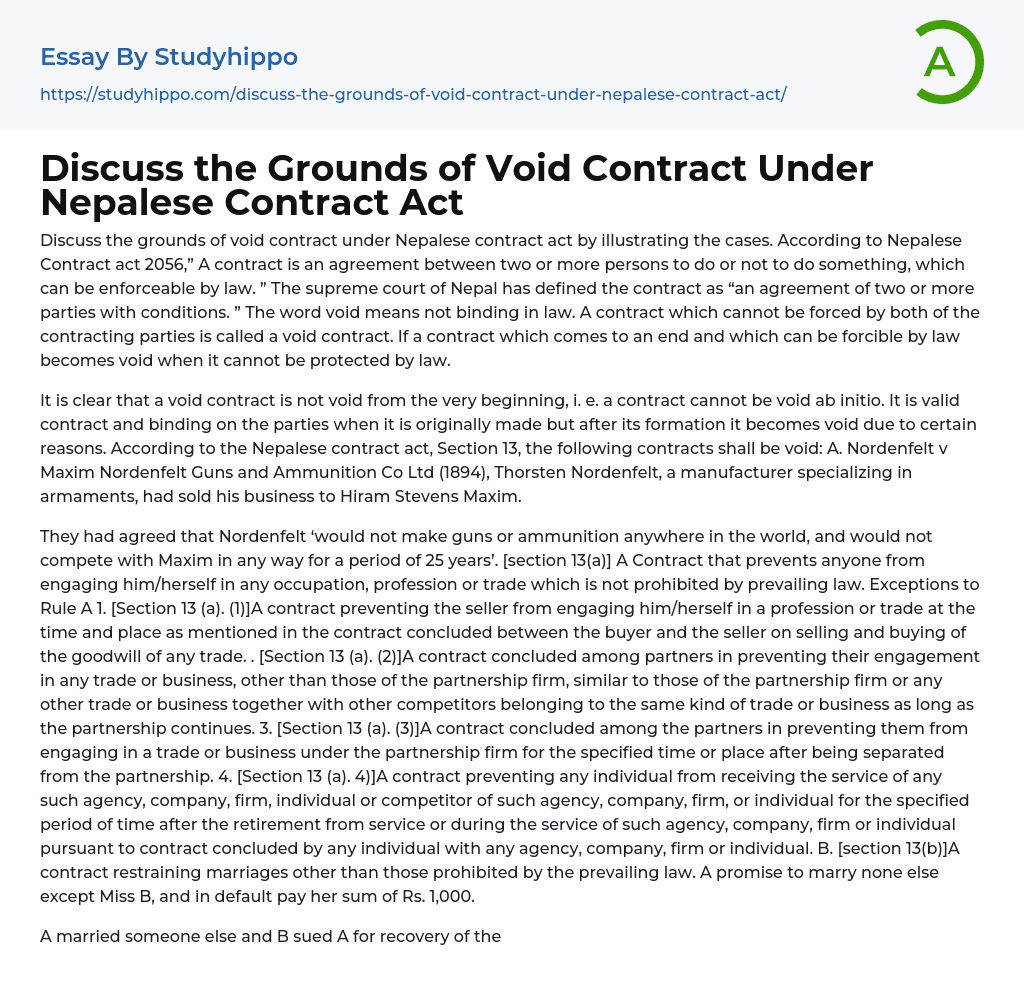

Discuss the Grounds of Void Contract Under Nepalese Contract Act Essay Example
The Nepalese Contract Act outlines the grounds for a void contract, which can be illustrated through examples. The act defines a contract as an enforceable agreement between two or more individuals to perform or refrain from performing a specific action. The Supreme Court of Nepal further elaborates that a contract is an agreement among multiple parties with specified conditions. Legally, "void" signifies that the contract lacks legal validity. Consequently, a void contract is one that cannot be enforced by any party involved. When an initially valid and enforceable contract loses its legality and protection under the law, it becomes void.
A void contract is not considered void ab initio, meaning it is not void from the start. Initially, it is a valid and binding contract between the involved parties; however, it later becomes void due to specific circumstances. Section 13 of the
...Nepalese contract act outlines that certain contracts shall be rendered void. One example of such a case is Nordenfelt v Maxim Nordenfelt Guns and Ammunition Co Ltd (1894), where Thorsten Nordenfelt, a manufacturer specializing in armaments, had sold his business to Hiram Stevens Maxim.
The agreement stated that Nordenfelt would not manufacture firearms or ammunition worldwide and would not compete with Maxim for 25 years [section 13(a)]. Exceptions to Rule A include: a contract preventing the seller from engaging in a profession or trade at the specified time and location when selling and buying goodwill [section 13(a)(1)]; a contract among partners restricting engagement in any trade or business unrelated to the partnership firm, similar to competitors' trades or businesses as long as the partnership is active [section 13(a)(2)]; a contract among partners disallowing engagement i
a trade or business under the partnership firm after separation for a designated period/location [section 13(a)(3)]; a contract prohibiting an individual from receiving services from agencies, companies, firms, individuals, or their competitors during or post-retirement agreed upon by all parties involved.Section 13(b) of the contract restricts marriage to individuals not prohibited by law. The agreement specifies that only Miss B will be married, and failing to fulfill this promise necessitates a payment of Rs.1,000.
A married someone else and B filed a lawsuit against A to recover the amount owed. The court ruled that the contract involved the restriction of marriage, making it void. C. [section 13(c)] A contract that prevents an individual from enjoying the same facilities as the general public. D. [section 13(d)] A contract that aims to prevent a person's legal rights from being enforced by any government office or court. E. [section 13(e)] A contract made in violation or prohibition of the existing law. F. [section 13(f)] A contract made for an immoral purpose or against public morality or public interest.
Sections 13(g) to 13(k) outline different categories of contracts that are deemed invalid or impossible to fulfill:
G. Insufficient knowledge about the subject matter renders a contract unenforceable.
H. A contract becomes impossible to fulfill upon its formation.
I. Contracts lacking clear and reasonable interpretation are considered vague.
J. Incompetent individuals entering into a contract can render it void.
K. Contracts with unlawful consideration or objective are also invalid.
- Jurisprudence essays
- Social Injustice essays
- Juvenile Justice essays
- Agreement essays
- Business Law essays
- Common Law essays
- Community Policing essays
- Constitution essays
- Consumer Protection essays
- Contract essays
- Contract Law essays
- Copyright Infringement essays
- Court essays
- Crime essays
- Criminal Law essays
- Employment Law essays
- Family Law essays
- Injustice essays
- Judge essays
- Jury essays
- Justice essays
- Lawsuit essays
- Lawyer essays
- Marijuana Legalization essays
- Ownership essays
- Police essays
- Property essays
- Protection essays
- Security essays
- Tort Law essays
- Treaty essays
- United States Constitution essays
- War on Drugs essays



